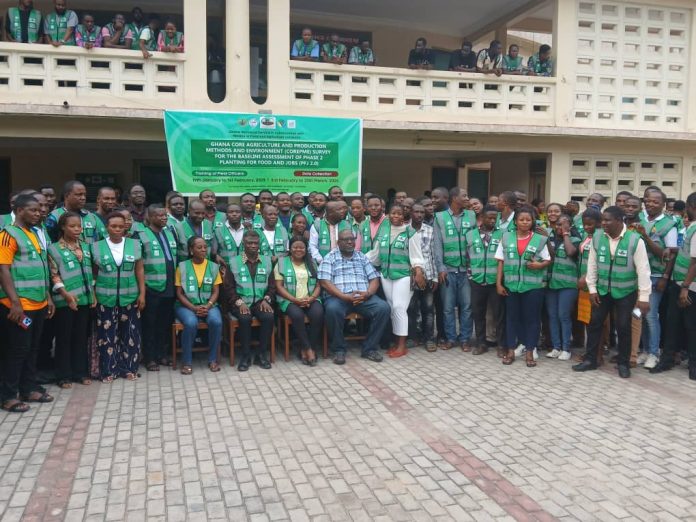The Ghana Statistical Service (GSS) in partnership with the Ministry of Food and Agriculture (MOFA) has launched a survey that will assess Phase 2 of the Planting for Food and Jobs (PFJ) initiative.
The Ghana Core Agriculture and Production Methods and Environment (CorePME) survey, part of the Ghana Core Agriculture Surveys (GCAS++), will gather critical data to support informed decision-making in the agricultural sector, ensuring sustainable growth and development.
This survey aims to provide reliable and up-to-date information on agricultural production and farm practices, supporting evidence-based policy making, enhancing food security, and sustainable agriculture.
It will also contribute to the baseline impact assessment of Planting for Food and Jobs Phase 2 and offer data on SDG 2.4.1, which measures the Proportion of agricultural area under productive and sustainable practices which improves resilience to climate shocks.
According to the GSS, the primary objective of the survey is to produce reliable benchmark data for the agricultural sector, fill data gaps, and guide evidence-based decision-making.
Also, GSS said it will assess the impact of PFJ 2.0, while providing insights into the environmental, social, and economic sustainability of farming practices. Additionally, it will contribute to greenhouse gas (GHG) emission calculations related to agriculture.
Again, GSS stated that the survey will produce official statistics on household and non-household farms to ensure high-quality agricultural data for policy development.
the Service said the survey will estimate production levels of crops, vegetables, livestock, fish, aquaculture, forestry, and bushmeat consumption, while also analyzing input usage such as labor, irrigation, and fertilizers.
“Furthermore, it will assess farm practices related to soil health and pollination.The CorePME survey will generate detailed estimates of crop, vegetable, and livestock production by type and region,” GSS stated.
It continued,”It will also assess fish and aquaculture productivity by type and location, along with data on the consumption and sale of bushmeat, forestry products, and utility poles.”
The GSS stated that the survey will evaluate the impact of deforestation and afforestation, determine the use of key agricultural inputs such as labor, irrigation, and fertilizers, and analyze farm practices related to soil health and pollination methods.
“It will also provide critical estimates on the proportion of seeds and plants used.A total of 220 trained field officers will collect data from agricultural households and institutions across selected Enumeration Areas (EAs) nationwide,” it added.
GSS noted that the fieldwork, scheduled from February 3 to March 20, 2025, will employ Computer-Assisted Personal Interviews (CAPI) to enhance efficiency and data accuracy.
It explained that the findings will provide crucial insights for policymakers and program developers to support farmers and agribusinesses.
“The survey will also help track Ghana’s progress toward the Medium-Term Development Framework and Sustainable Development Goals (SDGs), particularly 12 out of the 17 SDGs as well as offer statistical support for the Malabo Commitments under the Comprehensive Africa Agriculture Development Programme (CAADP), which focuses on ending hunger and eradicating poverty through agriculture,” GSS stated.
Meanwhile it said the success of CorePME depends on the active participation of farmers, agricultural workers, and community members.
GSS therefore urged all stakeholders to cooperate with enumerators by providing accurate information and granting access to farms and resources.
“All collected data will remain strictly confidential and used solely for statistical purposes, in accordance with the Statistical Service Act, 2019 (Act 1003). GSS encourages full stakeholder engagement to ensure accurate and reliable data for the advancement of Ghana’s agricultural sector. Your information matters. Together, we can drive sustainable agricultural growth in Ghana,” GSS stated.
Read Also: President directs Committee to plan National Education Forum within 2 weeks
About the Ghana Statistical Service
The Ghana Statistical Service (GSS) provides comprehensive, reliable, quality, relevant, accurate and timely statistical information to guide national development as stipulated in Section 3 of the Statistical Service Act, 2019 (Act 1003).
The organisation’s vision is to be a trusted provider of official statistics for good governance and its mission being the efficient collection, production, management, and dissemination of quality official statistics based on international standards, using competent and motivated staff for evidence-based decision-making, in support of national development.
The Statistical Service produces monthly and quarterly data on important economic indicators such as inflation, Consumer Price Index, Producer Price Index, and Gross Domestic Product.
GSS also regularly generates periodic population, housing, demographic and economic data at the locality, district, and national levels from routine surveys and censuses.
The statistics generated by GSS can be utilised by a wide cross-section of users including public sector, businesses, academia, civil society organisations and development partners. For more information visit www.statsghana.gov.g
Ghana| Atinkaonline.com



























